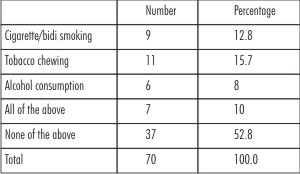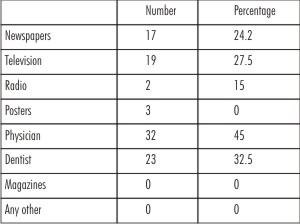Introduction
Oral cancer is one of the ten leading cancers in the world. In India, it is one of the common cancers and is an important public health problem. Annually, 7% of all cancer deaths in males and 4% in females have been reported due to oral cancers.[1] Incidence rate of oral cancer in India is 12.6 per 1,00,000 of population.[2]
Tobacco and alcohol consumption are the main risk factors in etiology of oral cancer. As many as 10% of patients who develop oral cancer have other cancers of upper aerodigestive tract which are in turn linked to continued alcohol and tobacco consumption.[3] Individuals who continue to smoke after being diagnosed with head and neck cancer have been found to be at increased risk for treatment-related side effects, disease recurrence, second primary cancers and mortality. [4]
Around the world, very few studies have been conducted to find out the knowledge of oral cancer - treated patients regarding causes of oral cancer and none have been reported from India. So, the present study is an attempt to assess the knowledge about risk factors and signs of oral cancer among patients treated for oral malignances and to obtain information regarding their habits of tobacco and alcohol consumption.
Materials And Method
The study population consisted of patients who had already been treated for oral squamous cell carcinoma either by surgery or radiotherapy or both in the last five years. Patients who were treated at least three months before the study was commenced were considered for participation. One Hundred and six (106) subjects who met the eligibility criteria were recalled by post, using normal inland letter, which consisted of information regarding the study and was signed by the appropriate authority. In total 70 individuals reported to the hospital after communication. Response rate was 66%, which is acceptable considering the age of these patients as well as poor survival rate of oral cancer after treatment. General information of patients like address for communication, type and site of oral cancer, type of therapy were collected from the medical records.
Data was collected by means of a questionnaire prepared to assess the knowledge of risk factors and signs of oral cancer among patients treated for oral malignances and to obtain information regarding their habits of tobacco and alcohol consumption.
The prepared questionnaire was pre-tested in a comparable (non-disease) group (n=20) in order to assess the validity of the questions. Based on the answers received for the questions, the questionnaire was slightly modified.
The final questionnaire consisted of 15 closed-ended questions. Nine questions were regarding knowledge about oral cancer, its various risk factors and signs. Two questions were regarding the association between beedi/cigarette smoking and lung cancer and alcohol drinking and liver damage respectively. One question was pertaining to their source of information for answering the above questions. Rest of the questions dealt with their past and present habits of tobacco and alcohol consumption and to find out the reason why, if they have not stopped the habit/s.
The survey was conducted over a period of 90 days in order to give time to subjects to respond to communication and report to the department. A second letter was send to non- respondent candidates after a month of time. The questionnaire was distributed to the patients individually by the investigator and they were asked to mark the responses, which they felt were correct. They were allowed to take help of accompanying person for understanding the questions.
The data was coded and analyzed using SPSS statistical software version 11.
Results
70 patients who were already treated for oral cancer participated in this study and completed the questionnaire. The mean age of patients was 57.8 years (range 35-74 years). Male patients constitutes an overwhelming majority of 80% (56) of the total participants in the study as compared to 20% (14) females patients. Half (50%) of the subjects were unaware of the fact that smoking beedi/cigarette increases the person’s chances of getting oral cancer , whereas 44% (43) did not know that betel or areca nut with tobacco chewing is associated with oral cancer. Merely 25% of the subjects were aware of the fact that heavy alcohol drinking increases the person’s chance of getting oral cancer (TABLE -1).
 | Table -1: Knowledge Of Subjects Regarding Risk Factors For Oral Cancer
 |
Majority of the subjects did not know about early signs of oral cancer like white or red patch or non- healing sore/ ulcer in the mouth as depicted in (Table -2).
 | Table -2 : Knowledge regarding early signs of oral cance
 |
All the subjects had the habit of cigarette /beedi smoking or tobacco chewing or alcohol drinking or combinations of these before being diagnosed of oral cancer. About 47% of them were still continuing with one or more habits at the time of the study (Table-3).
 | Table-3: Habits continuing at the time of study
 |
When asked about the reason for not quitting the habit/s, 77% (54) marked dependency or addiction as the major reason whereas the rest of them related it to stress. When asked about their source of information regarding the above questions, 45% of the subjects marked ‘physician’ whereas 32.5% marked ‘dentist’ as one of their information sources (Table-4).
 | Table-4: Source Of Information
 |
67.1% (47) of them knew that smoking bidi/cigarette increases the person’s chances of getting lung cancer and 72.8% (51) knew that heavy alcohol drinking increases the chance of liver damage.(Table-5)
 | Table-5: Knowledge Regarding Other Side Effects Of Tobacco And Alcohol Consumption
 |
Discussion
The role of tobacco and alcohol consumption in the etiology of oral cancer is a common knowledge among the medical/dental community, but those who have the disease are often less well informed. In the present study, 50% of the subjects were unaware of the association between cigarette/beedi smoking and oral cancer, slightly higher than when compared to a study done by Kerawala CJ[3] where it was 33%. A total of 56% knew that tobacco chewing causes oral cancer, in a similar study by Fabian MC et al[5] it was 20%. Role of alcohol as an etiologic factor is underestimated as merely 25% were aware of such association, which is comparable to study by Kerawala CJ[3] in which it was 34%. Such unawareness is also prevalent among general Indian population as found by Roychowdhury S[6] and Raval S[7] except for one study which found awareness level to be satisfactory.[8] Lack of knowledge about risk factors of oral cancers can be a major cause for patients to continue with these habits leading to recurrence of oral cancerous and precancerous lesions. In the present study 47% of the subjects were continuing with their habit of tobacco smoking, this result was similar to study by Kerawala CJ.[3] Most of the subjects were also unaware about early signs of oral cancer.
On the other hand, awareness regarding smoking as etiologic factor for lung cancer was 67.1% in our study. It was much less when compared to other similar studies[3],[5],[9] which reported a higher level of awareness among participants on relation between tobacco use and lung cancer than for oral cancer. These results show the difference in awareness of the association between tobacco use in oral cancer as compared to its role in lung cancer.
Patients claimed to obtain information from various sources. Medical and Dental staff were their main information sources (45% and 32.5% respectively), which is comparable to study done by Kerawala CJ[3] in which it was 49%. Few patients obtained information from public education sources such as television (24.2%) and news papers (27.5%), which is comparable to study by Fabian MC et al[5] in which it was 35%. Therefore, there is a need to make patients aware regarding the causes of oral cancer and its dangerous consequences.
Conclusion
The present study is different from other studies related to oral cancer in that it has included the group of individuals who have already got the cancer and have been treated for it. The findings of the survey show the lack of awareness about risk factors and signs of oral cancer among this group of patients. Tobacco and alcohol consumption are known to have a significant role in the etiology of oral cancer, yet the patients who had been treated for the disease seem to be ignorant about the causes of the disease. It is essential that patients be informed of the entire potential consequences of prolonged exposure to tobacco and alcohol, be it cardio- respiratory disease or the development of metachronous malignant lesions. Medical and dental staff needs to be active in this education process, as prevention or early detection may be the only effective measure left to change the mortality of this disease.
References
1. Peter S. Epidemiology, etiology and prevention of oral cancer. In : Essentials of Preventive and Community Dentistry, 4th ed. New Delhi: Arya (Medi)Publishing house, 2009:133-57
2. Peterson PE. The World Oral Health Report: Continuous improvement of oral health in the 21st century – the approach of global oral health programme. Community Dent Oral Epidemiol. 2003;31(suppl. 1):3-24
3. Kerawala CJ. Oral cancer, tobacco and alcohol: the patients, perspective. Br J Oral Maxillofac Surg.1999; 37:374-376.
4. Osroff JS. Prevalence and predictors of continued tobacco use after treatment of patients with head and neck cancer. Cancer. 1995; 75:569-576.
5. Fabian MC, Irish JC, Brown DH, Liu TC, Gullane PJ. Tobacco, Alcohol and Oral cancer: The patients’ perspective. J otolaryngol.1996; 25:88-93
6. Roychowdhury S, Roychowdhury G, Sen U. Assessment of awareness level on tobacco and smoking habits as risk factors for cancer among lung and laryngeal cancer patients in Kolkata--a case control study. Asian Pac J Cancer Prev. 2005 ;6(3):332-6
7. Raval S, Maudgal S, More N. Study on tobacco use and awareness among marginalized children. Indian J Cancer. 2010 ; 47 Suppl 1:14-8.
8. Elango JK, Sundaram KR, Gangadharan P, Subhas P, Peter S, Pulayath C etal. Factors affecting oral cancer awareness in a high-risk population in India. Asian Pac J Cancer Prev. 2009; 10:627-30.
9. Nugent AG, Moore CE. Adolescent awareness of risk factors associated with head and neck cancer vs lung cancer. Laryngoscope. 2010; 120 Suppl 4:S170.
|